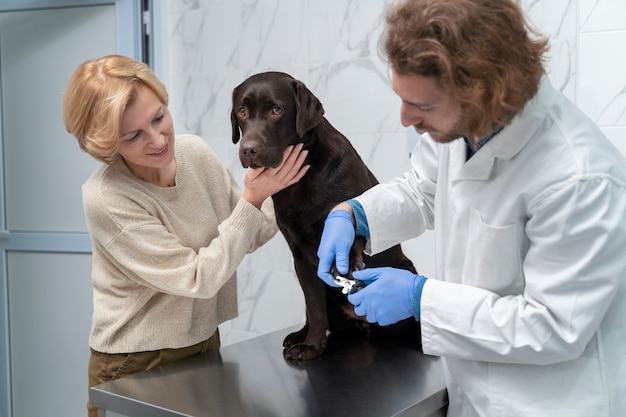When Persistent Lameness Means More: Cancer Signs in Pets


When Persistent Lameness Means More: Cancer Signs in Pets
If you have ever noticed your dog or cat limping for more than a few days, you may have wondered whether it’s a minor sprain or something more serious. Persistent lameness in pets is a common concern for South Florida pet owners, especially when it doesn’t resolve with rest or basic care. While injuries and arthritis are frequent causes, ongoing lameness can sometimes signal an underlying problem such as cancer. At Veterinary Cancer Health, located at 4101 Turtle Creek Drive, Coral Springs, FL 33067, our team of oncology veterinarians specializes in advanced cancer diagnostics for dogs and cats. We are dedicated to helping pet owners recognize cancer symptoms in dogs and cats early, so treatment can begin as soon as possible.
Throughout this blog, we’ll explain when to worry about persistent lameness, what cancer-related signs to watch for, and how our specialized cancer vet team can help you get answers quickly. You’ll learn about the causes of persistent lameness in pets, what modern diagnostic options are available—including comprehensive evaluations for pet cancer diagnosis and staging—and how to seek timely, specialized care. If you’re searching for an “oncology vet near me” or need expert cancer diagnostics in Coral Springs and surrounding communities, you’re in the right place.
Recognizing Persistent Lameness in Pets: When Should You Be Concerned?
Seeing your dog or cat limp, favor a leg, or avoid putting weight on a limb can be distressing. While many cases of lameness resolve with rest, persistent lameness—meaning limping or difficulty moving that lasts for more than a week—should prompt closer attention. In the warm, active climate of South Florida, pets often enjoy outdoor play, which can sometimes lead to minor injuries. However, when lameness does not improve or even worsens, it may indicate a deeper problem.
Key symptoms of concern include lameness that lasts beyond 7-10 days, visible swelling or a firm lump around a bone or joint, progressive pain or sensitivity to touch, reluctance to move or exercise, and changes in appetite or behavior. In some cases, you may notice that your pet cries out when touched or refuses to use an affected limb altogether. While these symptoms may suggest an injury or arthritis, persistent lameness in pets can also be one of the first cancer symptoms in dogs and cats, especially for certain types of bone tumors.
If you observe any of these warning signs, it’s important to seek a professional evaluation right away. Early detection of cancer can make a significant difference in your pet’s treatment options and quality of life.
Understanding the Causes: Why Does Persistent Lameness Occur?
Persistent lameness in pets has a variety of causes, ranging from the routine to the life-threatening. For many animals, especially older pets or active breeds, joint injuries and age-related arthritis are common culprits. Ligament tears, muscle strains, and infections can also lead to ongoing limping.
However, a less common but much more serious possibility is cancer, specifically bone cancer such as osteosarcoma. This type of cancer most frequently affects large breed dogs but can also occur in cats and small dogs. Tumors can develop in the bones of the limbs or spine, causing pain, swelling, and progressive lameness. Other cancers, such as soft tissue sarcomas or metastatic lesions from cancers elsewhere in the body, can also invade joints or bones and cause similar symptoms.
Additional contributing factors include genetic predisposition, previous trauma, and, in some cases, environmental exposures. The subtropical climate of Coral Springs and surrounding communities can occasionally influence the presentation of certain infectious diseases; however, cancer remains a significant cause of unexplained, chronic lameness in pets.
If your primary care veterinarian suspects a cancerous process, they may refer you to a specialist for advanced veterinary diagnostics in Coral Springs. At Veterinary Cancer Health, we work closely with both pets and their families to uncover the root cause of persistent lameness using state-of-the-art equipment and techniques.
Advanced Diagnostics and Treatment Options for Cancer-Related Lameness
When persistent lameness raises concerns about cancer, timely and accurate diagnosis is essential. At our specialty clinic in Coral Springs, our veterinary oncology team provides a full range of advanced cancer diagnostics for pets. The diagnostic process typically begins with a thorough physical examination and review of your pet’s history, followed by imaging studies to visualize the bones and surrounding tissues.
Diagnostic imaging options include digital radiographs (X-rays), which can reveal bone destruction or abnormal growths. In more complex cases, a CT scan for veterinary cancer diagnostics offers detailed, cross-sectional images to assess the extent of the tumor and involvement of surrounding structures. These tools are essential for identifying subtle changes that may not be visible on routine X-rays.
If a mass or suspicious lesion is detected, our team may recommend a biopsy and cytology procedure to obtain a sample for microscopic examination. This step provides a definitive diagnosis, determining whether the lesion is cancerous and, if so, what type of cancer is present. For particularly challenging or rare cases, our facility offers DNA sequencing and molecular analysis to further characterize the tumor and guide personalized treatment plans.
Treatment approaches for cancer-related lameness in dogs and cats depend on the specific diagnosis but may include chemotherapy, targeted therapy, immunotherapy, or a combination of these modalities. Pain management and palliative care are also integral components of our approach, ensuring your pet’s comfort throughout their treatment journey. Our oncology veterinarians collaborate with your primary care vet and tailor every protocol to your pet’s individual needs.
Supporting Your Pet at Home: What Can Pet Owners Do?
While advanced cancer treatment requires specialized veterinary care, there are several steps you can take at home to support your pet if you notice signs of persistent lameness. Monitoring your pet’s activity level, appetite, and comfort is crucial. Providing a soft, non-slip surface for rest and minimizing strenuous activities can help reduce pain and prevent further injury. Ensuring your pet stays at a healthy weight can also relieve pressure on affected limbs.
You should avoid giving any over-the-counter pain medications intended for humans, as these can be toxic to pets and may interfere with diagnostic testing. If your pet is already under a veterinarian’s care, follow all medication and care instructions closely, and communicate any changes in symptoms promptly.
Remember, persistent lameness in pets is not a condition that can be reliably managed at home without an accurate diagnosis. If you live in Coral Springs or nearby, seeking an appointment with an oncology vet near me can help ensure your pet receives the most appropriate and effective care.
When to Seek Specialized Veterinary Oncology Care
It can be difficult to know exactly when to transition from monitoring your pet at home to seeking professional help. As a rule of thumb, any lameness lasting more than a few days, especially if accompanied by swelling, a visible mass, or increasing pain, warrants a veterinary visit. Immediate evaluation is also essential if your pet refuses to bear weight, cries out in pain, or shows signs of systemic illness such as lethargy or loss of appetite.
If your primary veterinarian suspects cancer or if you desire a second opinion regarding unexplained persistent lameness, our oncology veterinary team at Veterinary Cancer Health in Coral Springs is here to help. We offer comprehensive cancer diagnosis and staging services designed to provide clear answers and guide your next steps.
Our specialty practice serves as a referral destination for advanced cancer diagnostics in Coral Springs and surrounding communities. Whether you are searching for an “oncology veterinarian near me” or “specialist vet near me,” our facility is equipped to handle even the most complex cases with compassion and expertise.
Conclusion: Take Action for Your Pet’s Health
Persistent lameness in pets is never something to ignore, especially when it lingers or worsens with time. While not every limp is a sign of cancer, early intervention is the best way to protect your pet’s health and comfort. At Veterinary Cancer Health, our specialized oncology veterinary team in Coral Springs is dedicated to providing the most thorough cancer symptoms screening and treatment options available. With services such as digital radiographs for pets, CT scans for advanced diagnostics, and biopsy and cytology services, we ensure your pet receives an accurate diagnosis and a customized treatment plan.
If you are concerned about persistent lameness in your dog or cat and are searching for a “specialist vet near me” or oncology vet near me, don’t wait to seek answers. Contact our veterinary professionals at Veterinary Cancer Health by calling (195) 459-28504 or visiting us at 4101 Turtle Creek Drive, Coral Springs, FL 33067. We are here to support you and your pet throughout every step of the cancer journey.
For more information about our comprehensive evaluations for pet cancer diagnosis and staging or to schedule a consultation, explore our website or reach out directly. Your pet’s wellbeing is our priority, and together, we can make the best possible decisions for their care.
This blog is intended for informational purposes only and should not replace professional veterinary advice. If your pet is experiencing persistent lameness or other concerning symptoms, please consult with a veterinary professional for a thorough evaluation and personalized care plan.

.png)
















